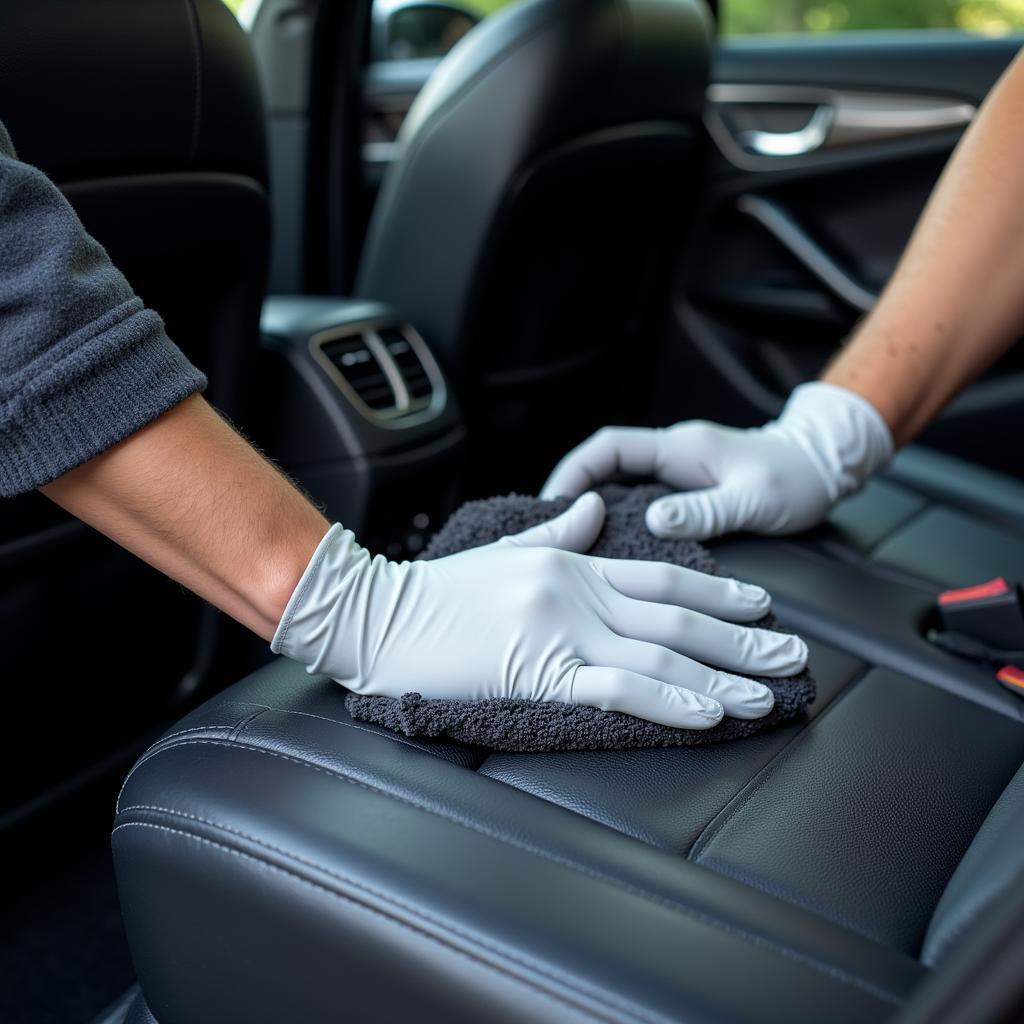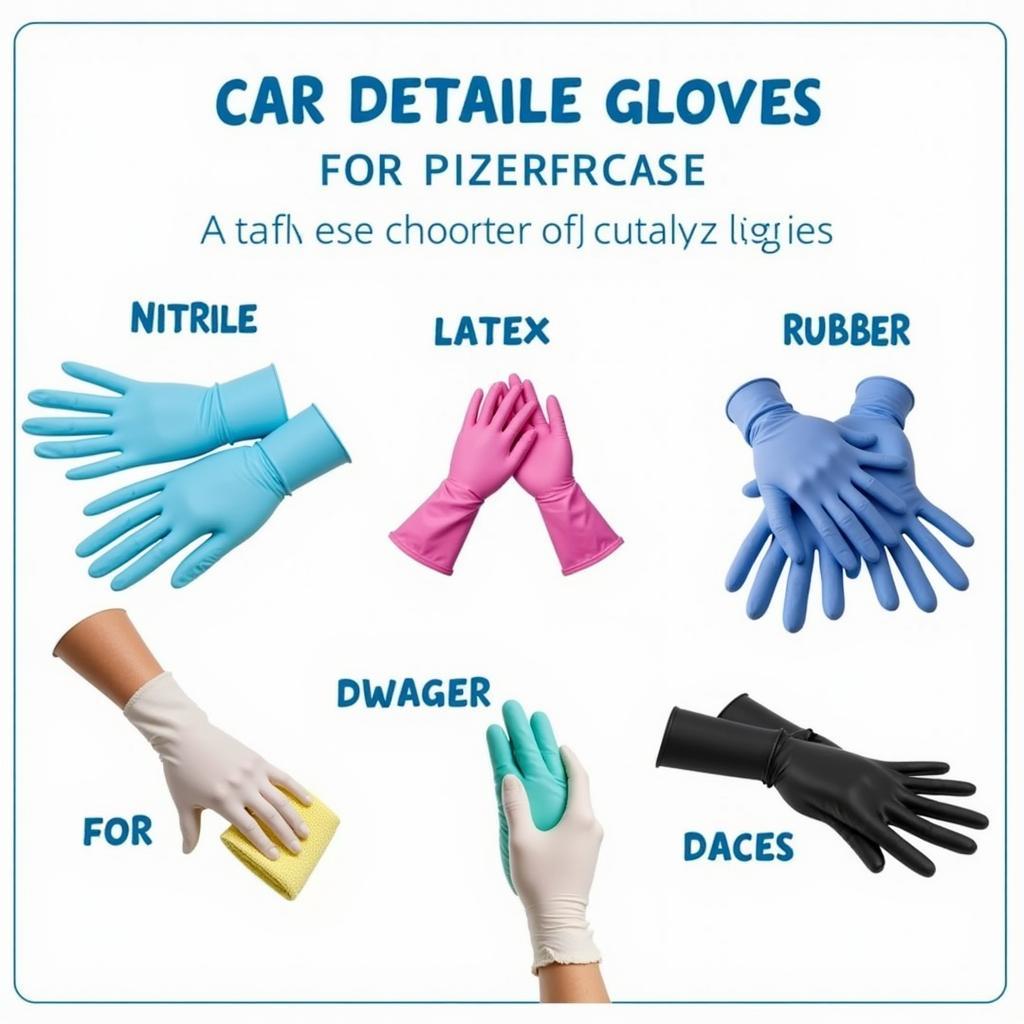Car detailers wear gloves for a multitude of reasons, encompassing both protection for themselves and the vehicles they meticulously care for. It’s not just about keeping their hands clean; it’s about ensuring a flawless finish and maintaining professional standards. From preventing scratches to avoiding chemical burns, gloves are an essential tool in the detailer’s arsenal.
The Protective Barrier: Safeguarding the Detailer
Car detailing involves working with a range of chemicals, some of which can be harsh on skin. Gloves provide a crucial barrier against these potentially harmful substances, preventing irritation, allergic reactions, and even chemical burns. Think of strong degreasers, wheel cleaners, and interior cleaners – all requiring that extra layer of protection. Furthermore, detailing often involves handling greasy, grimy surfaces, and gloves prevent the transmission of bacteria and other contaminants. This is vital for maintaining hygiene and preventing infections.
After this introduction about the importance of gloves for car detailers, you might want to learn more about how to achieve that showroom shine. Check out our guide on how to detail a car like new.
Preventing Cross-Contamination
Gloves also minimize the risk of cross-contamination. Imagine transferring residue from a wheel cleaner to a delicate interior surface – a disaster easily avoided with a fresh pair of gloves. Switching gloves regularly during a detail ensures each stage of the process is completed with pristine tools, minimizing the risk of transferring dirt or chemicals.
Preserving the Perfect Finish: Protecting the Vehicle
Beyond protecting the detailer, gloves play a critical role in protecting the vehicle itself. Bare hands can leave fingerprints, oils, and smudges on surfaces, especially on highly polished paintwork or glass. Gloves create a clean interface between the detailer’s hands and the vehicle, minimizing the risk of blemishes and ensuring a pristine finish.
Avoiding Scratches and Swirls
Believe it or not, even fingernails can inadvertently scratch delicate surfaces. Gloves act as a buffer, preventing these minor scratches and swirl marks that can detract from the overall appearance of the vehicle. This is particularly important during polishing and waxing, where even the slightest imperfection can be magnified.
Want to understand the role of IPA in car detailing? Visit our page on what does ipa in car detailing.
Enhanced Grip and Control
Certain detailing tasks require a firm and precise grip. Gloves, especially those with textured surfaces, provide enhanced grip and control, allowing detailers to handle tools and apply products with greater accuracy. This is particularly beneficial when working with intricate details or applying coatings in tight spaces.
 Car Detailer’s Gloved Hands Cleaning Interior
Car Detailer’s Gloved Hands Cleaning Interior
Types of Gloves Used in Car Detailing
Different types of gloves offer various benefits. Nitrile gloves are a popular choice due to their chemical resistance, durability, and tactile sensitivity. Latex gloves offer excellent dexterity but may cause allergic reactions in some individuals. Meanwhile, thicker rubber gloves are better suited for tasks involving harsh chemicals or prolonged exposure to water.
Choosing the Right Glove
Selecting the right glove depends on the specific task at hand. For intricate interior work, nitrile gloves offer the best balance of protection and dexterity. For tasks involving harsh chemicals, thicker rubber gloves are recommended. Always choose gloves that fit snugly but comfortably to ensure optimal dexterity and prevent slippage.
Are you struggling to remove quick detailer residue? Our guide on how to strip quick detailer off car offers effective solutions.
 Variety of Car Detailing Gloves
Variety of Car Detailing Gloves
Conclusion: Why Gloves are Essential for Car Detailers
Wearing gloves is a non-negotiable practice in professional car detailing. It’s not just about cleanliness, but also about protecting the detailer from harmful chemicals, preventing cross-contamination, and ensuring a flawless finish on the vehicle. From avoiding scratches to enhancing grip, gloves are an indispensable tool for any car detailer who takes pride in their work and strives for perfection.
FAQs
- What type of gloves are best for car detailing? Nitrile gloves are generally preferred for their chemical resistance and dexterity.
- Why do detailers change gloves frequently? To prevent cross-contamination between different areas and products.
- Can I detail my car without gloves? While possible, it’s not recommended due to the risk of skin irritation and potential damage to the car’s finish.
- Do gloves affect the quality of the detailing work? No, using the correct gloves enhances the quality by preventing fingerprints and scratches.
- Are all detailing gloves the same? No, different gloves offer varying levels of protection and dexterity, suited to different tasks.
- What are the signs of a chemical reaction from detailing products? Redness, itching, burning, or swelling of the skin.
- How often should I replace my detailing gloves? After each task or when they show signs of wear and tear.
Need further assistance? Contact us via WhatsApp: +1(641)206-8880, or Email: [email protected]. We have a 24/7 customer support team ready to help.

Leave a Reply